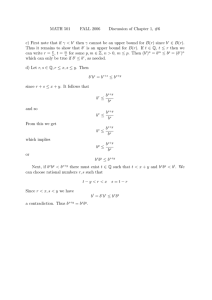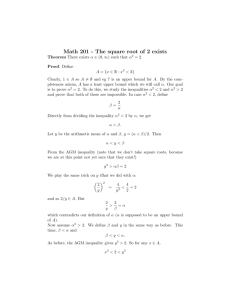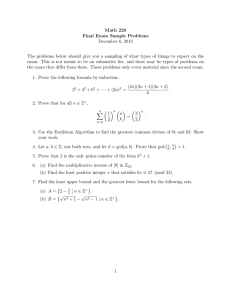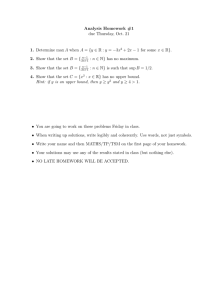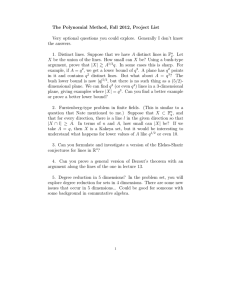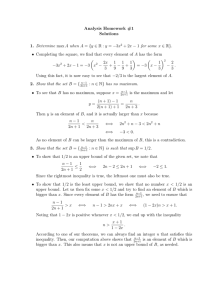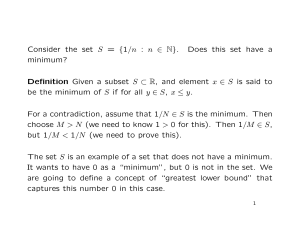Q Does Not Obey the Least Upper Bound Axiom
advertisement
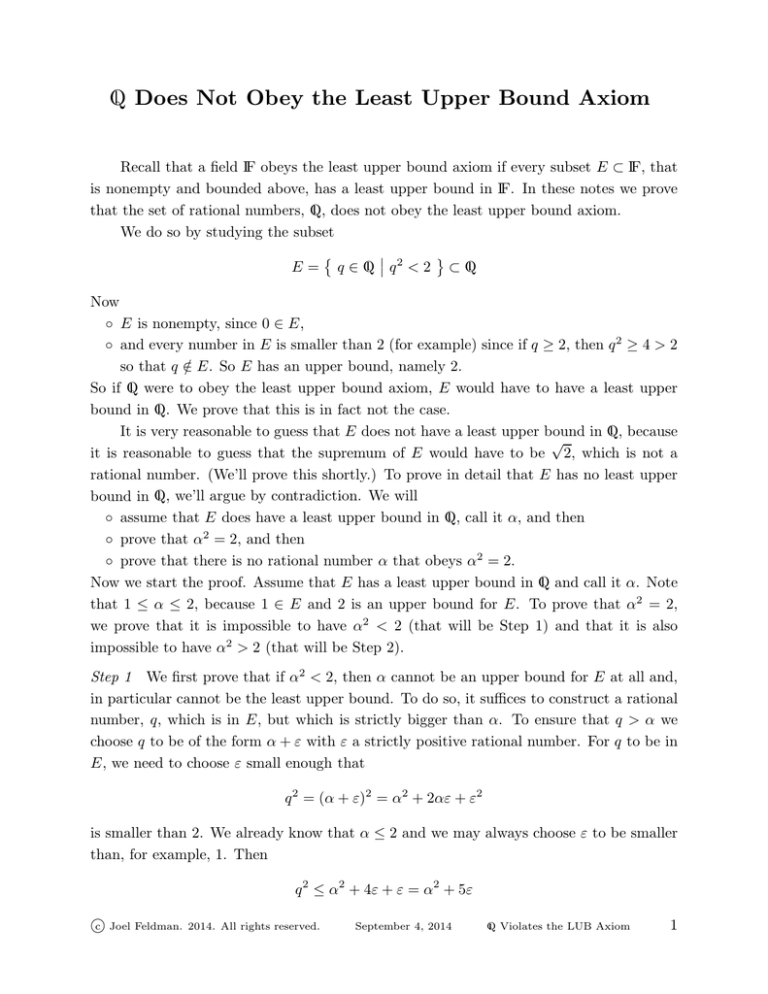
Q Does Not Obey the Least Upper Bound Axiom Recall that a field IF obeys the least upper bound axiom if every subset E ⊂ IF, that is nonempty and bounded above, has a least upper bound in IF. In these notes we prove that the set of rational numbers, Q, does not obey the least upper bound axiom. We do so by studying the subset E = q ∈ Q q2 < 2 ⊂ Q Now ◦ E is nonempty, since 0 ∈ E, ◦ and every number in E is smaller than 2 (for example) since if q ≥ 2, then q 2 ≥ 4 > 2 so that q ∈ / E. So E has an upper bound, namely 2. So if Q were to obey the least upper bound axiom, E would have to have a least upper bound in Q. We prove that this is in fact not the case. It is very reasonable to guess that E does not have a least upper bound in Q, because √ it is reasonable to guess that the supremum of E would have to be 2, which is not a rational number. (We’ll prove this shortly.) To prove in detail that E has no least upper bound in Q, we’ll argue by contradiction. We will ◦ assume that E does have a least upper bound in Q, call it α, and then ◦ prove that α2 = 2, and then ◦ prove that there is no rational number α that obeys α2 = 2. Now we start the proof. Assume that E has a least upper bound in Q and call it α. Note that 1 ≤ α ≤ 2, because 1 ∈ E and 2 is an upper bound for E. To prove that α2 = 2, we prove that it is impossible to have α2 < 2 (that will be Step 1) and that it is also impossible to have α2 > 2 (that will be Step 2). Step 1 We first prove that if α2 < 2, then α cannot be an upper bound for E at all and, in particular cannot be the least upper bound. To do so, it suffices to construct a rational number, q, which is in E, but which is strictly bigger than α. To ensure that q > α we choose q to be of the form α + ε with ε a strictly positive rational number. For q to be in E, we need to choose ε small enough that q 2 = (α + ε)2 = α2 + 2αε + ε2 is smaller than 2. We already know that α ≤ 2 and we may always choose ε to be smaller than, for example, 1. Then q 2 ≤ α2 + 4ε + ε = α2 + 5ε c Joel Feldman. 2014. All rights reserved. September 4, 2014 Q Violates the LUB Axiom 1 This is strictly smaller than 2 if α2 + 5ε < 2 ⇐⇒ ε < 2 − α2 5 2 So the number q = α + 2−α is a rational number in E that is strictly larger(1) than α. So 6 α is not an upper bound for E. Step 2 We next prove that if α2 > 2, then α cannot be the least upper bound for E. To do so it suffices to construct another rational number, q̃, which is an upper bound for E and that is strictly smaller than α. To ensure that q̃ < α we choose q̃ to be of the form α − ε with ε a strictly positive rational number. We choose ε small enough that q̃ 2 = (α − ε)2 = α2 − 2αε + ε2 is larger than 2. As α ≤ 2, we have −2αε ≥ −4ε so that q̃ 2 ≥ α2 − 4ε + ε2 > α2 − 4ε This is strictly larger than 2 if α2 − 4ε > 2 ⇐⇒ ε < α2 − 2 4 2 So the number q̃ = α − α 6−2 is a rational number that is strictly smaller than α, is strictly 2 2 larger than 0 (since α 6−2 ≤ 2 6−2 = 31 < 1 ≤ α) and obeys q̃ 2 > 2. To see that q̃ is an upper bound for E, observe that q ≥ q̃ ≥ 0 =⇒ q 2 ≥ q̃ 2 > 2 This shows that any number larger than q̃ cannot be in E. This completes step 2. By this stage we know that if α is a least upper bound for E, then α must obey α2 = 2. Step 3 We finally show that there is no rational number α that obeys α2 = 2. By definition, any rational number α has to be of the form m n with m an integer, n a natural number and with m and n having no common factors. But, if α2 = 2, this implies that m 2 =2 n 2 = 2n2 4 m 2 =⇒ =⇒ m2 = 2n2 =⇒ 2 is a factor of m, i.e. 2 =⇒ 2 m = n2 =⇒ 2 is a factor of n 2 m 2 ∈ ZZ So 2 is a common factor for m and n, which is a contradiction. (1) We have chosen ε = c Joel Feldman. 2−α2 . 6 Note that ε = 2014. All rights reserved. 2−α2 6 < 2 6 < 1, as desired. September 4, 2014 Q Violates the LUB Axiom 2
